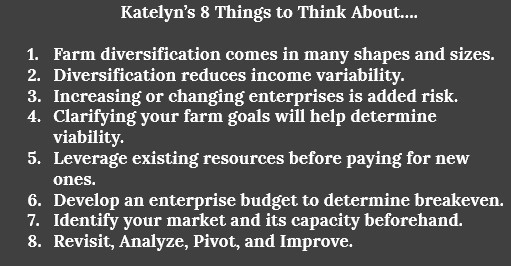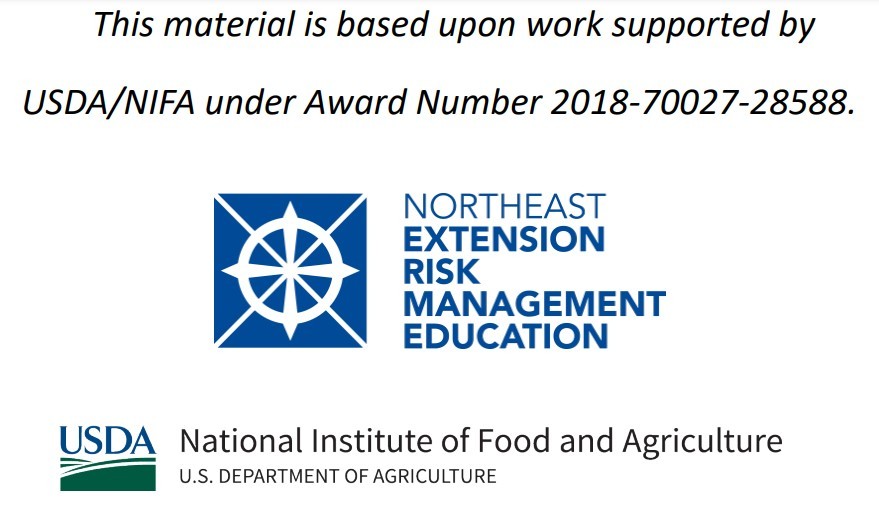8 Things to Think About - Farm Diversification and Enterprise Analysis
Katelyn Walley, Business Management Specialist and Team Leader
Southwest New York Dairy, Livestock and Field Crops Program

- Have you ever had a dream about adding of changing something on your farm, homestead, or business?
- Have you ever made a decision without making a budget first?
- Have you ever planted or grown or raised something without knowing who you were going to sell it to?
- Have you ever implemented a dream that went terribly wrong? Or a dream that went terribly right?
I'm guessing that you said "YES" to at least one of these things! When conversations about farm diversification come up, I always bring it back to our shared experiences…as dreamers, as doers, as innovators, as people who say "Well, that could have gone better". Specifically, to take this hot topic and break it down, here are my 8 considerations that (I think) are universal in conversations about farm diversification.
- Farm diversification comes in many shapes and sizes. Farm diversification is the act of increasing the number of enterprises on your farm. In this case, enterprises is just a fancy word for "things to do or sell". Farm diversification could be adding new products to sell, changing how you sell those products, and/or implementing new ways to make products. This is a great example of not putting all of your eggs in one basket (pun fully intended).
- Diversification reduces income variability. We all know that farming is act with a lot of inherent risk. Farm diversification can help reduce production risk on your farm in several ways. As you add and sell additional enterprises to your farm business, you can reduce cash variability. For example, let's say you sell produce every summer at the farmers market. Your cash inflows are quite variable as you see a spike in the market season and little to no income the rest of the year. If you added selling eggs, for example, that's a product that would be available to sell, and earn cash from, throughout the year. You also have the opportunity to spread fixed costs over more commodities - instead of that new tractor just plowing corn fields, it can also plow pumpkin fields. With farm diversification, you can additional utilize resources throughout the year and have a larger range of products to help increase market access.
- Increasing or changing enterprises is added risk. When considering adding any new farm enterprise, it's important to consider the possible consequences to your business. A new venture is risky with typically high first year losses, particularly if it's something that you'll need to gain new skills to master. There's also questions about market access if you're new to the game and the longevity/sustainability of new ventures, especially if they're jump on the bandwagon type crops (I'm looking at you goat yoga, hops, and hemp). Additionally, farm diversification can take you from specialized and efficient production (I only milk cows) to "mile-wide, inch deep" inefficiencies (I milk cows, grow pumpkins, process cheese, train oxen, harvest cut flowers, and go to farmers markets every week). None of these unintended consequences are deal breakers, but they're all important considerations.
- Clarifying your farm goals will help determine viability. I haven't met a farmer yet who got into the business of farming because they loved paperwork and planning. But, you should be sure that a new business venture fits into your farm's business plan. Don't have a business plan? No worries - we've got loads of resources to help you build one that will work for you! Having a business plan in place will help you to clarify your personal and farm goals to verify your new venture will fit in.

- Leverage existing resources before paying for new ones. Your farm is filled with resources, even if it sometimes feels like those resources are running thin. These can be categorized into physical, financial, and human resources. If you're planning for a new venture that will require the purchase or addition of several new resources, you should first consider if your farm has any underutilized resources that already exist that could be the foundation for a different enterprise.
- Develop an enterprise budget to determine breakeven. Who doesn't love budgets?! An enterprise budget is a slice of your whole farm budget pie. This looks at the incomes and expenses associated with a specific enterprise on the farm, taking into account variable and fixed costs. Having an enterprise budget (don't worry - we have resources to put those together, too) will help you determine a breakeven price and the financial viability of a new venture.
- Identify your market, and its capacity, beforehand. Don't do anything without knowing who you're going to sell to. Don't do anything without knowing who you're going to sell to. DON'T DO ANYTHING WITHOUT KNOWING WHO YOU'RE GOING TO SELL TO. That's a marketing plan in a nutshell. You shouldn't start a new venture on your farm without first knowing where/who/what your market is and verifying that there's room for you.
- Revisit, analyze, pivot, and improve. But also - have an exit plan. When you decide to embark on a new farm enterprise, be sure to hold yourself accountable for checking in on how things are going. Revisit your budget, your business plan, and your books often. Analyze if the new enterprise is serving you and your farm positively - have you seen an improvement in profitability? Cash flow? Is the new venture providing your farm with benefits that outweigh the cost and your time? If the answer to any of these questions is "no", don't be afraid to pivot! Schooch some things around, change markets or tactics, and see if you can make it improve. If you do these things without success, don't be afraid to enact your exit plan and try something new.
For more information about farm diversification, contact Katelyn Walley-Stoll at 716-640-0522. This article was written as part of Cornell Cooperative Extension's "Diversifying Your Dairy" initiative. This material is based upon work supported by USDA/NIFA under award number 2021-70027-34693.

Upcoming Events
Crops, Cows & Critters - Southwest New York Dairy, Livestock & Field Crops Newsletter Sponsorship
December 19, 2025
Our two forms of publications feature research-based and timely information from our four specialists, listed to the right, along with local event notifications and Cornell University outreach. This information is provided to participants who range from dairy, livestock, and field crops producers to agricultural suppliers and consultants.
Weekly Email Update: Shared with 625+ households who have signed up with our program.
Monthly Paper Mailer: To reach our stakeholders and farmers who lack internet access, we send out a monthly mailer where your company's logo and contact information would be featured with a mailing list of 330+ households.
If you sponsor our weekly and monthly publications you reach approximately 955 households.
Visit our website to view our newsletters!
2025 Cornell Food Beverage & Animal Feed Manufacturer Survey
December 19, 2025
Industry and Educational Advocates for New York State's Food, Beverage, and Animal Feed Manufacturing industries:
As you know, NYS has a diverse food and beverage manufacturing industry, in both the types of industries that exist and the wide distribution of firms by scale. Many manufacturing firms have strong backward linkages to agricultural production sectors in the state that support both farm-level and downstream food industry firms and consumers. In collaboration with the New York State Department of Agriculture and Markets, a team from Cornell University's Charles H. Dyson School of Applied Economics and Management has recently rolled out the 2025 New York State Food, Beverage, and Animal Feed Manufacturer Survey. The industry will benefit from an updated assessment of the industry that informs private and public investments and opportunities to support firm growth and improved profitability.
Cornell Organic Field Crops & Dairy Conference
March 6, 2026
Waterloo, NY
Farmers, researchers, educators, and agricultural service providers from across the Northeast are invited to the 2026 Cornell Organic Field Crops & Dairy Conference, held Friday, March 6, 2026, from 8:00 a.m. to 4:30 p.m. at the Lux Hotel & Conference Center in Waterloo, N.Y.
Co-hosted by New York Soil Health and Cornell CALS, the annual conference brings together leaders in organic grain, dairy, and livestock systems to share practical tools, new research, and farmer-tested strategies to support resilient and profitable organic production.
Announcements
No announcements at this time.





